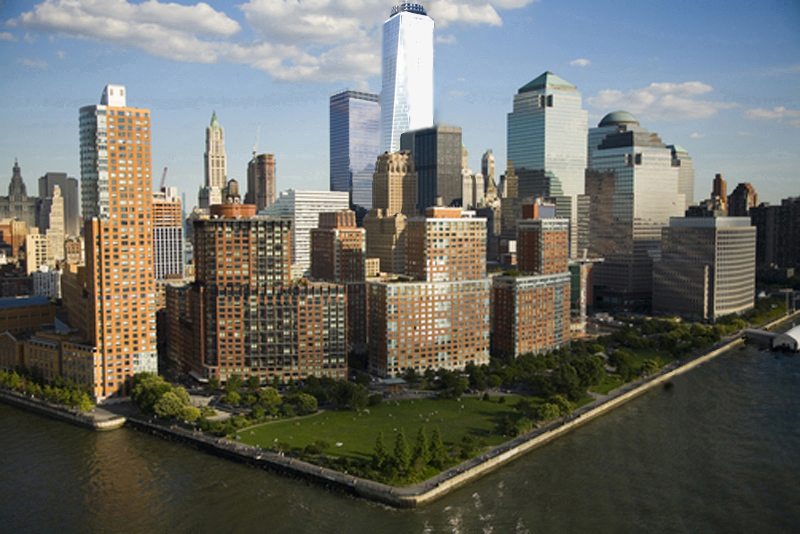This post has been read 4672 times!
 December 4, 2013- By Steven E. Greer, MD
December 4, 2013- By Steven E. Greer, MD
Over the last three years, Governors of New York have appointed three different administrations to run the Battery Park City Authority (BPCA) in Lower Manhattan, along the Hudson River. Two of the Chairmen, James Gill and Bill Thompson, abruptly resigned after scandals, and the third one, Dennis Mehiel (also the CEO), is trying to survive his own series of scandals. All three of the Presidents, James Cavanaugh, Gayle Horwitz, and Demitri Boutris, have resigned. (The departures of Boutris and Horwitz were days after exclusive reports in BatteryPark.TV of scandals.) Robert Serpico is the current “Acting President”, making him the fourth one to run the BPCA within three years.
The scandals and chaos of the BPCA are all caused by the hundreds of millions in annual budget surplus enjoyed by the BPCA, as well as the millions accruing in a “lock box” of funds. In New York, nothing attracts scandals to an agency like large piles of cash. It is Smaug to treasure.
For decades, former Battery Park City Authority (BPCA) administrations have advocated for the dismantling of the BPCA and turning the property over to the city, to no avail. In April of 2012, State Senator Squadron made a rare appearance before the CB1 and gently suggested major changes to the BPCA, but the plan was ignored.
Now, a critical mass of support for the city taking over the BPCA property might have been reached with the new mayor coming into office soon. BatteryPark.TV exclusively reported that Bill de Blasio is taking a serious look into the option. Others are jumping on the bandwagon, and the idea has momentum.
At the December 3rd BPC subcommittee of the CB1, the puppetmaster of the CB1 (i.e. Katherine McVay Hughes, who gets her marching orders from the elected officials) had clearly instructed the board to bash the BPCA and argue that the city take over. Heretofore, not a peep of negativity toward the almighty BPCA was uttered from the CB1 leaders, such as Anthony Notaro.
With the idea of the city taking over control of the 92-acres of Battery Park City now a legitimate reality, who would benefit and who would lose out if it happened? To answer that, one needs to realize that the BPCA exists solely to serve as a large slush fund for the city and state. As such, most of the “losers” if the BPCA went away would be city agencies benefiting from creative accounting deals with the BPCA, and also the private “nonprofits” that suckle from the city.
Losers if the BPCA is dissolved
The Governors of New York:
The BPCA, since it was created in 1968 by the BPCA Act, has always been a playground of the Governor of New York. He has appointed the chairmen and board members. The construction contracts and other RFP contracts awarded to private sector companies, such as law firms, lead to generous campaign donations to the governor, whomever he may be at the time. (The recent Moreland Commission set up by Governor Cuomo criticized New York politics for being a “pay to play” arrangement, with large campaign donors controlling policy and legislation.). Losing control of the BPCA would seem to be a negative for the governor.
The City Parks Department:
BP.TV has exclusively reported that the lucrative contract with the BPCA that the city enjoys is really a way to funnel BPCA money to the parks. BPCA pays cash for 45 PEP officers that are actually reassigned to non-BPC parks, such as Hudson River Park and Battery Park (not to be confused with the BPC parks). The residents of BPC pay with their tax dollars (i.e. PILOT fees) $2.5 Million to have 8 to 11 PEP officers on duty at any given shift. Yet only a few of those officers are actually on the property. They are reassigned to other parks.
If the BPCA vanished, that financial shell game would come to an end. The New York City Department of Parks and recreation would be a clear loser here, as would BPC’s PEP Captain Ed Falcon.
The BPC Parks Conservancy:
The biggest concern among BPC residents about the city taking over is that the current pristine parks would deteriorate into the rundown conditions of nearby city-owned Battery Park, or worse, like Prospect Park. That might be true, but a “Friends of Battery Park” could be created to raise private dollars, just as all of the other parks have done.
Moreover, the current sources of funding for the parks, which are derived from residential and commercial tenants paying Civic Facilities Maintenance Fees and ground rents would not go away. The facility fee is more than $5 Million and the bulk of the current BPC Parks Conservancy budget. Unless the city flat out misappropriated those funds, the parks should have a continued budget equivalent to, or better than, the current budget. (Below, we explain more why the current leases and fees would not go away if the city took over the BPCA.)
The City DOT:
The BPCA pays for many services now that the City (and State) DOT would otherwise be on the hook for funding. For example, the BPCA just agreed to spend $323,000 to fix the Tribeca pedestrian bridge that either the state or city DOT’s would have had to pay for. As another example, the city is hoping beyond hope that the BPCA will fork over more then $7 Million to pay for the proposed West Thames pedestrian bridge. If the BPCA is dissolved, say goodbye to those funds and the bridge.
The City Comptroller:
As an independent elected office, the City Comptroller has its own budgets and incentives to divert cash from the BPCA for its own purposes. One of the missions of the BPCA when it was formed was to collect revenue from wealthy people and divert it to pay for low-income housing elsewhere in the city. Whether the money actually ends up benefiting any low-income people is impossible to tell. Money is fungible and the BPCA balance sheet assists in the shell game. Losing the BPCA would be a loss for the comptroller.
The CB1 schmucks:
The entire Battery Park City subcommittee of the CB1 could be eliminated if the BPCA vanished. At the least, the relevance of board would be diminished. The lame block party, funded by the BPCA, would cease, or be forced to find sponsors, etc.
Bob Townley and Manhattan Youth:
Bob Townley (also a CB1 member) would lose out if the “Googles of money” of the BPCA, as he described it, stopped flowing to his Manhattan Youth community center. After BatteryPark.TV reported on the more than $750,000 awarded in free money to Manhattan Youth, the BPCA cut him off. He has been whining and lobbying ever since to have those funds restored. No more BPCA means no more free money for Bob.
Winners
Apartment owners of BPC:
The PILOT (Payment In Lieu of Taxes) charges on real estate owners in BPC is the euphemism given by the BPCA for property taxes. (No one living in BPC actually owns property. They lease.) The tax-per-square-foot for BPC apartments is roughly twice that of Tribeca when the BPC fees are all added together (The ground rent, PILOT fees, and facility fees). That extra cost, in addition to the fact that “owners” really do not own anything but rather are subjected to the long-term lease environment of the BPCA and uncertainty related, drives the valuation of apartments way down compared to Tribeca.
Because BPC is a suboptimal location in which to buy, as described above, the vast majority of buildings are rentals. The community suffers as a result.
People who rent are transient and do not typically care about issues as much as owners. For example, when the CB1 tried to sneak a new tax onto people living near the Hudson River Park, there was a well organized revolt that shot it down. In BPC, the BPCA and CB1 get away with financial transgressions of huge scale, and no one seems to care. For example, in 2010, at the worst of the economic depression, Governor Paterson and Mayor Bloomberg conspired to raid $861 Million from the BPCA using bonds.
Also as a result of BPC being a rental community rather than an ownership community, the BPC subcommittees of the CB1, for example, are usually attended by only one to three residents. In contrast, Tribeca CB1 meetings usually have dozens of concerned residents. As a result of this apathy, BPC has horrible grocery stores, deteriorating parks, noise problems from dogs, ferry boats, and helicopters, and so on.
However, it is not clear whether dissolving the BPCA would transform the BPC from a leasing community to an ownership community (see below).
The City of New York:
If Mayor de Blasio does decide to take over the BPCA when no previous mayor has chosen to do so, it will be because his administration has concluded that it makes financial sense to do so now. What revenue streams could the city gain? How might it help pay off the budget deficits the city is suffering?
The PILOT fees, ground leases, and Civic Facilities Maintenance Fees are the revenue streams to be gained. If the city took over BPC and became the new “landlord” rather than the BPCA, then the current renters could decide to purchase their land. The corporate tenants could easily do this. Goldman Sachs, LeFrak, and Brookfield Properties would likely buy their properties, converting the city’s ground leases into instant cash worth unknown billions. This is possibly what the Mayor de Blasio administration is looking to achieve.
For the residential buildings, it would be more difficult to transition them into ownership buildings. Each apartment “owner” now, with existing mortgages, would have to come up with hundreds of thousands of dollars through second mortgages or other means. Since this is unlikely to happen quickly, the facility fees and ground rents would likely continue to exist, providing funds for the parks, as mentioned previously.
Society and Justice:
Finally, the more abstract “winners” if the BPCA were to be dissolved would be society at large and justice. The Federal GAO issued a report this year that singled out the New-York/New-Jersey bi-state “authorities” as being corrupt. In general, “authorities” such as the BPCA are created to skirt the oversight and rules of the states. The fact that the BPCA is working on its third administration in three years due to multiple scandals says it all. The United States will be less corrupt if the BPCA were dissolved.
Exclusive: BPCA President Demitrios Boutris resigns amidst internal investigation
Did the Chairman/CEO of the BPCA investigate himself?
Exclusive: President/CEO of BPCA Gayle Horwitz resigns
Squadron discusses plan to change the BPCA
Exclusive: Mayor de Blasio’s staff in talks to take over the BPCA for $1
CB1 has been given the green light to call for the end of the BPCA
Exclusive: Is the BPCA paying the city for no-show PEP officers?
Exclusive: A source of funds for the Stuyvesant Community Center
Exclusive: West Thames bridge still stalled despite comments from the city to the contrary

Your assessment seems correct, the individual owners would have to come up with the funds to buy out the land lease. This has happened before with co-ops as they can take out underlying mortgages to fund such a conversion from land lease to full land ownership.
However if they could convert the rental properties to condos that would propel their values into the stratosphere and probably spur landlord buyout of existing tenants so as to cash in on the newfound condo equity.
RYAN STENTA
LICENSED REAL ESTATE SALESPERSON
DOUGLAS ELLIMAN REAL ESTATE